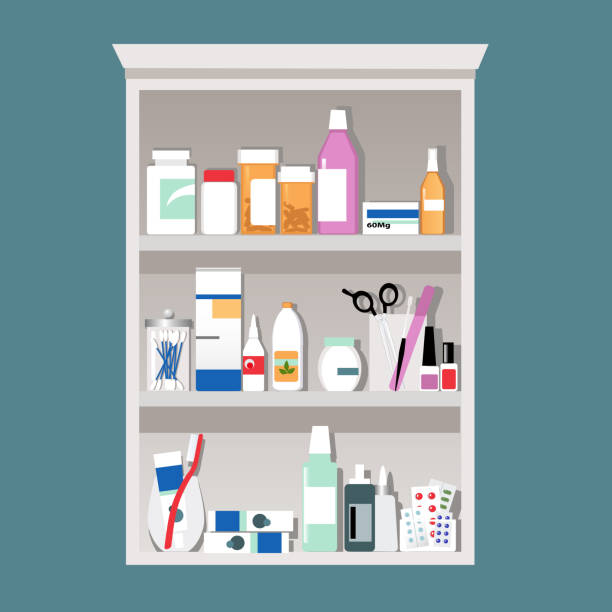Drugs and Medications
Must-Have Medicines at Home
Creating a well-stocked home medicines cabinet is an essential part of keeping a prepared and healthy household. When dealing with sudden illnesses, minor injuries, or unforeseen health issues, having critical medications and first aid supplies on hand can make a big difference in how you manage situations. In this article, we’ll look at the essentials for a well-stocked home medicines kit, including over-the-counter pharmaceuticals, basic first-aid supplies, and medical tools. From pain relievers and cold medicine to bandages, antiseptics, and thermometers, we’ll walk you through the process of creating a well-rounded collection of medical basics that will allow people and families to manage common health conditions effectively and quickly from the comfort of their own homes.

Essential Medications
Every home should have a minimal stock of drugs to treat common ailments. The following drugs are advised to be stored at home:
Pain and Fever Management
Pain and fever are common signs of numerous disorders. Over-the-counter pain medicines such as acetaminophen, aspirin, ibuprofen, and naproxen can help alleviate these symptoms. Acetaminophen is a fever reducer and minor pain reliever, whereas aspirin, ibuprofen, and naproxen are nonsteroidal anti-inflammatory medications (NSAIDs) that can alleviate pain, fever, and swelling. It is critical to remember that aspirin should not be administered to children under the age of 18 due to the danger of Reye’s syndrome.
Allergy Relief
Sneezing, runny nose, and itchy eyes are just a few of the symptoms associated with allergies. Antihistamines such as loratadine, cetirizine, and diphenhydramine can help alleviate these symptoms by inhibiting the effects of histamine, a substance produced by the body in response to allergens. It is important to note that some antihistamines might induce drowsiness, so consult your doctor or pharmacist before taking them.
Digestive Aids
Over-the-counter antacids such as calcium carbonate and magnesium hydroxide can help with digestive problems such as heartburn, acid reflux, and indigestion. These drugs operate by neutralizing gastric acids. Proton pump inhibitors (PPIs), such as omeprazole and lansoprazole, can also be used to lower stomach acid production.
Cough and Cold Remedies
Coughs and colds can be treated using over-the-counter cough and cold medicines. Cough suppressants like dextromethorphan can assist lessen coughing, and expectorants like guaifenesin can help loosen mucus in the lungs. Decongestants such as pseudoephedrine and phenylephrine can aid with nasal congestion. It is crucial to remember that certain cough and cold treatments may include various components, so check the labels carefully and consult with a doctor or pharmacist before using them.
Finally, having a minimal supply of vital medications at home can assist manage common illnesses. However, before taking any drug, you should discuss it with your doctor or pharmacist, especially if you have any underlying medical conditions or are on other medications.

First Aid Essentials
Nobody can foresee when an injury or accident will occur, therefore it’s critical to keep a well-stocked first aid box at home. Here are some key items to keep in your kit:
Treatment for Cuts and Scrapes
Minor cuts and scrapes are frequent and can be treated at home with the items listed below:
- Adhesive bandages come in a variety of sizes and are ideal for treating minor cuts and scratches.
- Antibiotic ointment: Applying antibiotic ointment to a wound may help prevent infection.
- Tweezers: Use tweezers to remove debris or dirt from the wound.
- Gauze is useful for cleaning and covering bigger wounds.
Managing Burns and Sprains
Burns and sprains can be unpleasant and uncomfortable; however, the following items can help alleviate the pain:
- Burn cream is useful for soothing and cooling the damaged region.
- Cortisone ointment can alleviate swelling and stinging caused by bug bites or rashes.
- Ace bandage: To provide support, put an ace bandage around a sprained ankle or wrist.
Remember to follow the instructions on the package and get medical attention if the injury or condition is serious.

Tools and Accessories
Thermometers and Measuring Devices
A thermometer is a vital tool for any medicine cabinet. It is used to assess a person’s body temperature and can assist in determining whether or not they have a fever. There are various types of thermometers available, such as digital, infrared, and mercury. Digital thermometers are the most accurate and simple to use, whereas mercury thermometers are less popular due to the risk of mercury poisoning.
A calibrated measuring cup or spoon is another useful tool to keep in your medical cabinet. These technologies are used to precisely measure medicine doses, which is critical for ensuring that the appropriate amount of medication is provided.
Application and Comfort Tools
Aside from measuring gadgets, your medicine cabinet should have a variety of application and comfort tools. These items include syringes, droppers, cotton balls, and ice packs.
Syringes and droppers are often used for giving medication to children and pets. They come in a variety of sizes and are intended to make it easier to measure and dispense liquid medications.
Cotton balls are excellent for cleaning and applying treatment to wounds. They are soft and mild on the skin, making them suitable for usage in sensitive areas.
Ice packs are essential for lowering swelling and pain associated with injuries such as sprains, strains, and bruises. They can also be used to treat fevers and headaches.
Overall, keeping these tools and accessories in your medicine cabinet will help you prepare for common medical scenarios and deliver medicines safely and effectively.
Conclusion
Finally, a well-stocked home medicine cabinet is an invaluable resource for confidently and efficiently dealing with common health concerns and emergencies. Individuals and families can effectively manage a range of health conditions at home by ensuring that necessary drugs, first aid supplies, and health-related gadgets are easily available. However, it is critical to examine and update the contents of the medicine cabinet on a regular basis to reflect changing needs and to ensure that medications are fresh and effective. Furthermore, keeping open contact with healthcare practitioners, understanding proper usage and dosages, and seeking professional advice when necessary are all essential components of responsible self-care. Individuals can improve the well-being and safety of themselves and their loved ones by keeping a well-stocked home medical kit and knowing how to use it properly.
Trusted Health, Wellness, and Medical advice for your well-being


